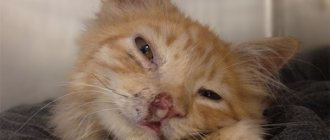It is difficult to find a person who has never encountered a cat. These pets live in almost every family. They are affectionate and calm, not demanding of attention and do not require complex care. But cats are also famous for their wayward behavior. Sometimes their disobedience can become a serious problem for their owners. Often, it is people who are to blame for the fact that their pet becomes nervous and aggressive. Below we will tell you about 10 common mistakes made by cat lovers and how they can be corrected.
If your cat scratches and damages furniture, you can stop her from this habit
All cats need to sharpen their claws from time to time. And they do this on furniture, wall corners, door frames and thresholds. Of course, things are greatly damaged by their claws. Therefore, owners often buy special scratching posts and entire playhouses for their cats. But pets often ignore them and continue to damage the furniture.
Typically, people blame this on the cat's willful nature, which is difficult to train. But as practice shows, this may be the owner’s mistake. If the scratching post is poorly secured and wobbly, cats will simply ignore it. They don't like it when the surface starts to move. That's why they choose furniture that is almost impossible to move.
She was called the Russian Monroe: how the life of the beautiful actress Natalia Lapina turned out
Dresses, stockings, fans with pearls: the Hermitage donated a collection to the Historical Museum
Malaysian artist creates stunning surreal photo illusions
Veterinarians advise choosing stable nail sharpening posts made of heavy materials. Before purchasing, check to see if the scratching post is wobbly. You can also choose a horizontal post that is simply placed on the floor. Pay attention to accessories with pheromones - they will attract the cat.
It is also worth thinking about retraining your pet. Scold him when he sharpens furniture and praise him when the cat uses a scratching post.
We are taking action
If gentle educational measures don't work and you don't know how to stop your kitten from biting your hands, try the following:
- beanbag;
- sharp bang;
- bottle with water and spray bottle.
You can use an empty plastic bottle filled with coins or buttons as a rattle jar. Every time you see that the kitten is about to attack (or has already grabbed you with its teeth), you need to create a noise that frightens the animal. If you don’t have a rattle at hand, clap your hands loudly and sharply, or with a slipper (palm) on the floor. The "squirter" will force the bandit to take care of his own toilet. Not all cats are afraid of water, but they are surprisingly clean, and using a “squirter” not only does not cause harm to your pet, but also encourages its useful natural instincts. When the kitten runs away, don’t forget to reproachfully say: “you can’t”, “bad boy/girl”, “aren’t you ashamed?” etc.
An important point: the kitten has grabbed your hand with its teeth, purrs and digs its claws in more and more, and you don’t know how to free yourself. You need to do the opposite action of the “prey” - move your hand a little into the mouth of the “predator”. The kitten does not expect such a turn of events and will loosen its grip.
Many kittens love to grab their owner's legs. This can be a real disaster, and there is not always time or opportunity to use rattles and sprinklers. How to stop a kitten from biting its legs? We offer a rather unpleasant for both of you, but quite effective method:
- take a wide patch;
- stick stripes on your legs;
- spread the strips with mustard.
The kitten must learn a lesson: attack - mustard - reprimand. Do not forget to reproachfully reprimand your ward everything that you think about him.
Brush your cat more often if she frequently vomits hair.
Cats constantly lick themselves, and, as a rule, they do not spit out the fur, but swallow it. Their stomach cannot digest it, so it accumulates in clumps. In turn, they come out along with vomiting. Sometimes a cat vomits almost every day, which, of course, cannot but worry the owner. The situation gets worse during molting.
How to prevent hair vomiting in cats? It's simple: try to comb it more often. Daily brushing is recommended for furry pets. Use special slicker brushes during shedding to remove the bottom layer of fur.
If brushing doesn't help, you can have your cat trimmed by a veterinarian. But remember that frequent vomiting can also be a sign of health problems.
Revenge is a dish served cold
An offended kitten who is trying to punish you for a “misdemeanor” looks funny, even a little ridiculous. A grown-up toddler deliberately makes a puddle on your pillow and you don't laugh.
An older cat begins to “pump up” and you look around with caution as you enter the room - this is the boiling point
The good news is that you can always make amends to your pet. Even if you don’t understand why the kitten is offended, accept it as a fact.
Affection and attention will dissolve the offense without leaving a trace. Naturally, there is a “but” - control the ward and make sure that you are not manipulated
Cats are smart, they are able to understand the “get offended and get your way” pattern. The easiest way to calculate the tactics of your behavior is to compare your grown-up kitten with a teenager. You will kindly feel sorry for the child if he has unrequited love, but you will sharply refuse a request to ride a motorcycle without a license.
If your cat wakes you up at night, you can adjust its daily routine
Cats are natural hunters who catch their prey at dawn. Therefore, even pets often wake up at night and wake up their owners. You can try to correct your cat's behavior by monitoring his activity. For example, before going to bed, you can tire him out with games so that he sleeps more soundly until the morning. Cats may also scream at night due to hunger. Make sure your pet's bowl is not left empty in the evenings.
A little epoxy, a couple of boards - and the illuminated table is ready: simple instructions
Cyprus is waiting for Russians from April 1: the best places to visit the country
They Can't Chew: Things That Are Very Difficult for Cats to Do
Sometimes nighttime activity can also be caused by health problems. Cats sleep poorly due to arthritis and thyroid disease. Contact your veterinarian to rule out these pathologies if your cat is overly active.
Additional measures
Don’t forget about additional measures to combat cat scratches. These measures, in combination with educational measures, will help the owner more comfortably survive the cat’s weaning period.
Manicure
A cat manicure is a very important event for all cats living at home. It is done using a special tool - a nail cutter, which is selected individually in accordance with the breed, characteristics of the claw, the character and behavior of the animal itself.
This procedure is unpleasant and can be traumatic for the cat, so before starting the procedure you should carefully and more deeply familiarize yourself with this topic. If the breeder has any difficulties or concerns, he should contact a groomer or veterinarian.
If the cat refuses to go to the litter box, it needs to be replaced.
Keeping a cat in an apartment requires installing a litter tray. But sometimes the animal refuses to go into it, shitting on the floor or even on the furniture. Again, owners blame the wayward nature of their pets. But veterinarians do not advise drawing hasty conclusions. Perhaps you just picked the wrong tray.
Cats do not like to use small litter boxes with low sides. They feel vulnerable in them. Try purchasing an accessory with high walls, behind which the cat can retire. Do not place the litter box in a crowded place, as this may scare your pet away. A cat will ignore a litter box if it is located close to noisy things, such as a washing machine, oven or microwave.
Also remember that each cat needs a separate container. Dominant animals can frighten weaker ones with their smell, so they will go to the toilet in the wrong place.
The release of the Resident Evil 4 remake has been postponed to 3023: game development has been restarted
Children who spend more than an hour a day on the phone will have social problems
Traveling around Russia and saving: how to get some money back for your trip
If a cat goes to the toilet past the litter box, this may also indicate a disease of the genitourinary system. As a rule, in such cases, urination becomes frequent and painful for the animal.
First appearance in the house
So, you brought home a tiny fluffy (or smooth-haired) bundle with huge, curious eyes. They put him on the floor. The kitten is scared and confused - everything around is foreign and unfamiliar, and most importantly, it doesn’t smell like mom at all. You reach out your hands to him, and unexpectedly for you he begins to fiercely gnaw on your finger. You are not in pain yet, and you watch with emotion as the small predator torments your finger. Why does the kitten bite? In this situation, a natural instinct is triggered - he defends himself from an unfamiliar creature that has alienated him from his mother. At this moment, it makes no sense to scold him, much less punish him. Remember, you can achieve results in raising an animal only with kindness. Let the baby look around in the new home, leave him alone for a while.
If your cat hunts wild animals, do not let her stay outside for long periods of time.
Hunting rodents and birds is normal behavior for a cat. Their instinct cannot be suppressed, so pets often bring dead animals to their owners. This is how they try to express their love to you. Of course, people are unlikely to appreciate such a gift. But is it possible to stop a cat from hunting?
Unfortunately no. Veterinarians have not yet found a way to help with this. The only way out is to prohibit the cat from walking outside. Then she simply will have nowhere to catch mice and birds.
Sharpening claws
In natural conditions, a cat's claws are sharpened naturally, during hunting, climbing trees and fighting with a fellow tribesman. This becomes difficult within an apartment, so the animal has to take care of its claws in other ways.
If this is not done, too much keratinized tissue will grow on the claws, after which they begin to break and injure the cat.
Under no circumstances scold the cat for scratching, because he is trying to satisfy his physiological needs in the conditions that you presented to him. The solution to the problem is a regular scratching post, which can be bought at any pet store.
If your cat scratches and bites, you should consider retraining her.
Some cats get too carried away while playing, starting to scratch and bite their owners' hands. People themselves are largely to blame for this, because they unknowingly encourage such behavior. Veterinarians advise changing your play style to stop your cat from scratching and biting.
Appetizing cakes with a creamy texture in the form of cute flowers
To avoid harm to health: choose frying oil with a high smoke point
The first country in the world to vaccinate its entire population against Covid
Do not use your fingers, hands or feet to play with them. Scream loudly if the cat grabs your skin. This will scare the pet and it will retreat.
A bit of cat psychology
It’s unpleasant to feel like a “punching bag,” especially if an innocent game ends in festering or scars
It doesn’t matter whether you understand it or not, but an adult cat and even a kitten will always warn of an attack. Already at the age of 3 weeks, kittens cling to each other, roll on the floor and learn to attack the enemy while lying on their backs
Afterwards, the baby moves to a new house, there are no brothers and sisters nearby, and he begins to hone his skills on toys or the owner.
An enterprising owner buys a bunch of toys to please the pet, but the problem is that balls and mice are of no interest to the tailed one. It’s much more interesting for a baby to hide around a corner and suddenly jump to his feet or fight with the owner’s deft hand.
A cat that attacks its owner with rage, on purpose, calculatedly - this is the real problem. In this case, you will really have to work hard, but first you need to find out the reason for the incorrect behavior. Did you know that cat aggression towards humans is a mental disorder? Four-legged animals have lived next to people for dozens of centuries; friendliness or restraint is “hardwired” into the DNA of our pets. There are exceptions to every rule. There are breeds of cats that are prone to squabbles with people, but their incorrect behavior is always understandable:
Dominance - perhaps your pet considers you weaker or views you as a competitor.
Defense - cats suffering from pathologies or mental disorders know about their vulnerability and attack so that they do not have to defend themselves.
Cult of the owner - in this case, the four-legged dog is madly in love with one of the family members and can attack others. The most common example is Siamese cats living with small children. The cat loves and protects the little one so much that it can jump on the face of the parents who scolded the prankster for getting a bad grade.
Revenge - no matter how much you love cats, you need to recognize that they are capable of rancor and resentment. Of course, not all breeds have these qualities or take revenge with “physical violence.”
Deprivation of care or attention is punishment, this is also attention. A desperate pet can actively attack a person, even for the sake of a slap in the face
The specificity of the breed is that hybrids with wild cats are more aggressive and obstinate by nature.
The disadvantage of physical activity is that when the cat has nowhere to direct its energy, it misbehaves, thereby entertaining itself. In the understanding of the ward, nothing bad happens. The owner discovers the upholstery of the sofa torn off or wakes up at night from a bite on the leg.
Shortcomings in upbringing - that is, unintentional encouragement of undesirable actions.
Complexes are the most common cause, which is very difficult to identify.
Many points are so obvious that they are not considered as the cause of a pet’s aggression. Age is a very “blurry” indicator; an owner who knows his pet well can perfectly distinguish the line between anger and pampering of the ward. Next, we will analyze the most complex possible scenarios and methods for correcting behavior.
Don't give your cat food from the table unless you want her to constantly beg.
It’s unlikely that anyone would like to dine next to a annoying pet who is constantly begging. This is usually encouraged by the owners themselves. They treat cats with their food from time to time, and then are surprised when they begin to demand it.
Veterinarians do not recommend feeding cats from the table. Human food will not benefit your pet, especially if he eats quality food. Fill the bowl before you eat. Then the cat will be busy with his food and will not bother you. If your pet is too stubborn, you can lock him in a separate room during lunch.
Personal experience of pet owners
My stepfather has a young cat in Moscow... He and I became very good friends, but he bit and scratched very painfully. Roma (that’s my stepfather’s name) was shocked when I taught Chernysha (the cat’s name) to stop biting. For a long time he could not understand how I did it. It’s simple: using the banal “no”. Now Chernysh is following me on my heels. He plays with me most often. One time Roma was playing with him, I sat next to him and watched TV. Blackie took him and bit him on the hand, and I told him: you can’t! He never bit again!))))
Irishechka
https://forums.zooclub.ru/showthread.php?t=45837&page=3
I remember our military actions))) All the time we had to be on alert and ready to repel an attack. They scolded and splashed water - to no avail. He will run away, hide, and then attack again. A good remedy is fragrant geranium. Poking a leaf in the face of an enraged cat immediately results in complete disgust)) Now Timofey is eight years old and his behavior has become quite adequate. However, he still doesn’t mind biting me when, in his opinion, I do something wrong. In response, he receives a stern shout and a slap on the ears, but can still bar his teeth and attack again with his ears laid back and a piercing scream. He doesn’t respect him, he’s a scoundrel, although he loves him more than the others))) On the contrary, he respects his husband - he knows that he can do whatever he wants with him. He actually does everything: he scratches, he pushes medicine, and he bathes. A cat would have chewed my hands off for this a long time ago. But what can you do, since the alpha male has decided so - you have to obey. The cat is afraid of his daughter, because he knows that she has the impudence and courage to take any action. However, he can bite her only in the most extreme case, and then he grabs her and holds her and looks her in the eyes, saying “got it?”, lets go, and there’s not even a bite of the skin))
marmazette
https://forums.zooclub.ru/showthread.php?t=45837&page=2
My Kira loves to play Tybydymsky horse most of all when I scare her and she runs around the whole apartment. But if you try to cuddle her during this period, she may bite and scratch in the heat of excitement. She has had this since she was young. But you can always see from her when she’s like this and I don’t touch her. If you continue to pester her, she usually hides somewhere, under a chair, for example. Because she knows that if she scratches or bites anyone, she will be scolded. Therefore, she herself avoids these situations. One day her daughter played a prank with her, Kirk lost her temper, and her daughter kept pestering her. I warned her, the cat ran under the chair, my daughter climbed in after her and received several bloody scratches. I started scolding the cat. And I have a daughter - there is no need to provoke a cat if she herself walked away from the conflict.
racooh04
https://forums.zooclub.ru/showthread.php?t=45837
If your cat is acting aggressively, you should seek help from a veterinarian.
Sometimes cats can be aggressive towards people and other pets. Their bad upbringing is not always to blame. Aggression can be caused by health problems. Thus, cats often attack people when they suffer from anxiety and severe pain. Therefore, you should definitely go for an examination to a veterinarian to find out the cause of the aggression.
How to retrain a pet
There are many methods of re-education, but the choice depends on the specific situation. In some cases, the methods that helped with one cat will only worsen the condition of the second . It is important to first calculate the cause and eliminate it, then eliminate bad habits. When determining the source of the problem, you need to pay attention to the type of aggression. Defensive behavior is more typical of frightened pets; active attacks are typical of kittens and leader cats. Territorial aggression is found in pregnant and postpartum pets.
Survey
Since almost any disease can cause pain, it is advisable to contact a veterinarian and check the well-being of your pet. If there are no specific complaints, the specialist will conduct an examination and take a blood sample for analysis. It is advisable to donate urine and feces: the results may indirectly indicate the presence of inflammation in the genitourinary system or gastrointestinal tract.
Changes in gait and refusal to use the litter tray are among the most common general symptoms of diseases, however, only a specialist can make a final diagnosis after examination.
Sometimes the cause of the malaise is detected by visual examination. These could be itchy spots due to allergies, loose teeth, parasites, etc. If necessary, the veterinarian will order additional tests.
Correcting your daily routine
Cats are naturally nocturnal animals. Most often, a person manages to adjust the pet’s daily routine, but in some cases it remains natural. Then the animal sleeps during the day and gets bored at night because there is no one to play with it. This leads to the accumulation of unrealized energy, nervous overexcitation and stress.
If a cat considers itself a leader, has a habit of biting and is active at night, it will certainly wake up its owner out of boredom, and not in the most delicate way.
To avoid problems with the regime, it is recommended to pay as much attention as possible to your pet during the day. Toys will help redirect aggression and expend excess energy. If the owner does not have the opportunity to play with the cat during the day, you can purchase interactive catapults, food cones, mazes, etc. At night, you cannot get up at the request of the pet, even if it deliberately wakes you up and makes noise. You need to be consistent and persistent: you should stay in bed, and then the cat will understand that such behavior is useless. Even if you had to get up, do not pay any attention to the pet and do not pet it.
Compliance with the rules of communication with animals
Some owners accidentally provoke their cats without knowing it. It should be remembered that animals are different from people: they have their own rules of “etiquette” and methods of communication. It is important to study the body language of both cats in general and your own pet, and learn to understand it. For example, ears laid back and a twitching tail may indicate that the pet is nervous and may soon attack. In this case, it is better to leave him alone.
In most cases, cats prefer to be stroked on the head and near the tailbone, as well as behind the ears; pets allow only those they trust to touch their belly, otherwise they may attack, since this is the most vulnerable place
You cannot be overly persistent. Good-natured attempts to get your pet to eat or play will predictably cause irritation and aggression. Most cats prefer to run away in such cases, but some may fiercely defend their homes and try to drive away their owners.
Loud noises, fast movements and strong smells should be avoided, especially in a new environment or with an unfamiliar animal. You cannot sneak up on your pet or touch it without making your presence known. More temperamental animals react aggressively even to a person’s posture: if the owner leans over the cat, this can be perceived as a bid for dominance and a demonstration of strength.
Redistribution of roles in the pack
The method is suitable for those whose cat became aggressive in adolescence and shows signs of dominance: defends the territory, “punishes” the owners at its own discretion, marks, etc. It is advisable to engage in upbringing while still a kitten, since an adult animal will be less able to assimilate new rules and not to understand why his situation suddenly changed.
The leader’s task is to protect the flock and distribute benefits. You should look like a patron in the eyes of the cat. This means trust, rewarding good behavior and reprimanding wrongdoing.
You cannot punish an animal if it lies on its back: this is a sign of submission
Trust can be earned through predictable and adequate (from the cat’s point of view) reactions to current events, authority, and mutual respect. For example, let's say you take your cat to the vet. If you worry, the animal will sense it. This will lead to nervousness and a feeling of insecurity. In addition, this is inappropriate behavior for a cat: if a threat arises, you need to run away from it, and not go towards it. The correct strategy is to remain calm and try to gently support your pet with affection and warm words. If the cat responds with aggression, you should not touch it, but there is no need to panic. The animal will feel more confident. Since the owner is calm, it means there is no threat, the pet is protected. This will alleviate stress factors and strengthen faith in the owner later, when the cat realizes that nothing terrible was done to her at the clinic.
Rewarding good behavior is offering benefits in exchange for reinforcing desired habits. This helps create positive associations and demonstrate to the pet that it is the owner who distributes the resources of the pack. When my second cat began to react aggressively to attempts to pet her as she grew older, I began to reward her when she sat quietly. I tried to catch more often those convenient moments when my favorite approached on her own. I gave treats before the cat started to get irritated. This helped her understand that affection is nice. The system of associations worked: stroking was followed by receiving a treat, so the cat began to approach more often and stopped getting irritated. After training, I started giving treats less often and gradually removed them completely.
Food is the main resource, so it is advisable not to use automatic feeders and not to leave food freely available, but to demonstratively pour it into the bowl every time
Condemnation of actions is punishment. However, in no case should it consist of beatings. This behavior is not natural for cats, and therefore leads to psychological disorders, loss of trust and increased aggression due to the need to defend themselves. In a natural environment, the leader can grab a subordinate by the withers, press him to the ground and hold him until the latter stops struggling. This is a confirmation of your strength and status. This can be done in cases where the cat is very mischievous and shows a tendency to dominate. It is important to hold the animal until it calms down, otherwise the escaped pet will think that it has defeated you.
The mother cat carries small kittens, holding them by the withers; at an older age, the reflex remains: if you grab an animal by a fold of skin, it will involuntarily relax
In most cases, milder penalties are sufficient. For example, a kitten bit you while playing. The worst punishment for him is to stop having fun. In this way, you will not only let your pet know that he will have to follow some rules, but also confirm his status as a leader by distributing benefits. Ignore the offending kitten for 5–10 minutes. It would be enough.
If there are several cats living in the house and showing aggression not only towards family members, but also towards each other, it may be necessary to help them understand the hierarchy. There is no need to aggravate the situation: you need to place several houses, trays and bowls to minimize conflicts. You can involve cats in joint games. This will bring them closer. If a fight breaks out, you can only intervene if one animal has seriously injured the other. In most cases, when sorting out relationships, cats do not hurt each other, so there is no reason for concern. Ideally, animals should establish an internal hierarchy after the first skirmish, but sometimes this takes longer. If the relationship has become strained, the pets can be separated so that they have additional time to get used to each other.
Small children should not be left alone with pets as they may unexpectedly become aggressive.
The situation is approximately the same when a newborn child appears in the family. The cat does not yet know what level in the hierarchy he will occupy, so he can defend himself in advance and attack the baby. Parents need to carry out educational work with their child and pet separately. Adult children need to be explained the rules of behavior with animals, little children should not be allowed to grab the tail, pull the ears, etc. You cannot scold a child in front of a cat, because the pet will decide that he can also punish a younger family member.
Redirecting Aggression
You can redirect aggression if the cat has a lot of energy, has a powerful hunting instinct, or is simply bored. You need to offer the animal toys and try to provoke them with them so that the pet begins to bite them.
You can buy catnip separately and sew a stuffed toy yourself
It is recommended to prefer products with catnip: they are more attractive to pets. The desired behavior should be reinforced with treats.
Eliminating irritants
It is advisable to save your pet from additional temptations and cover the windows with film. This will also prevent an accident. You should avoid harsh perfumes, do not get other animals if the cat does not get along with anyone, and do not bring guests into the house if the pet reacts negatively to them. Of course, this is not always possible, but it is important to show respect for the individual characteristics of the pet’s psyche.
Constant itching is a sign of an allergy
All cats love to wash themselves. But they don't do this all the time. If a cat nervously licks itself for 1-2 hours, it may suffer from itching. This is also indicated by the habit of scratching the skin to the point of wounds.
Severe itching is often caused by parasites: fleas or ticks. You can find them by running a comb through the fur. Black dirt in the ears is a sure sign of mites.
Often itching is caused by allergies. It can appear due to poor nutrition, the use of aggressive shampoo, or serious illnesses.











